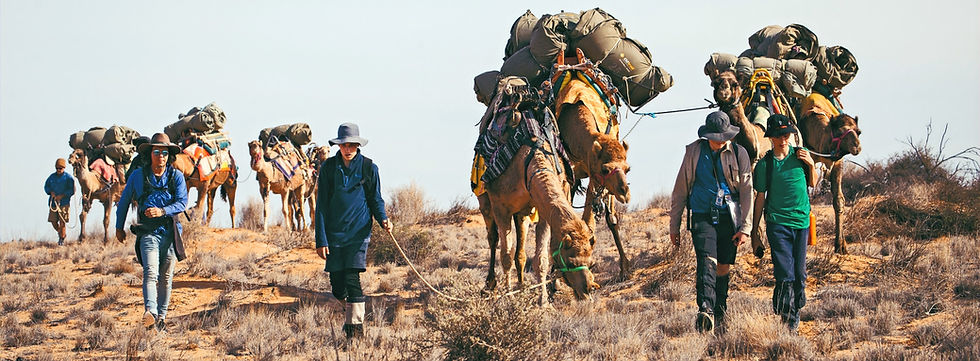
Outdoor Camping Benefits
Outdoor education and camping provide a wide range of benefits for students. It allows them to learn through hands-on experience in a natural environment, promoting physical activity and healthy lifestyles.
Outdoor education also fosters team-building skills and leadership qualities, and improves problem-solving and decision-making abilities. Camping outdoors also helps students develop an appreciation for nature and a sense of environmental stewardship.
By spending time in the great outdoors, students can also improve their communication skills and develop a sense of self-confidence and independence. These experiences can have a positive impact on their personal and academic growth, and provide a valuable opportunity for teachers to enhance their classroom instruction with experiential learning.

Structured Adventure
Camel Treks Australia is a distinguished camp provider that specialises in showcasing the unparalleled beauty of the Outback while prioritising the protection and preservation of animals in their natural habitats. Our school camps are designed to provide a unique and unforgettable experience that inspires students to become environmentally conscious and animal-focused individuals.
Our camping facilities are clean, comfortable, and feature private toilet tents, campfire chairs, and top-of-the-range self-contained 'one-man' tent-style swags with thick mattresses. Our programs incorporate navigation, cooking, animal husbandry, and outdoor camping skills, providing students with an opportunity to gain valuable practical knowledge in a natural environment.
We believe that healthy and delicious meals are essential for students during their camping experience. Our menus are designed to cater to all dietary requirements, with unlimited access to second servings to ensure students are well-nourished and energised throughout the day.
Our treks offer a genuine adventure, with experienced staff dedicated to sharing the whole experience with students. Schools can choose to join us from 3 days to two weeks, where students can participate in activities that encourage team-building, leadership, problem-solving, and decision-making.
A Camel Treks Australia school camp promises to be an unforgettable experience, leaving students feeling inspired and motivated to make a positive impact on the environment and animal welfare.
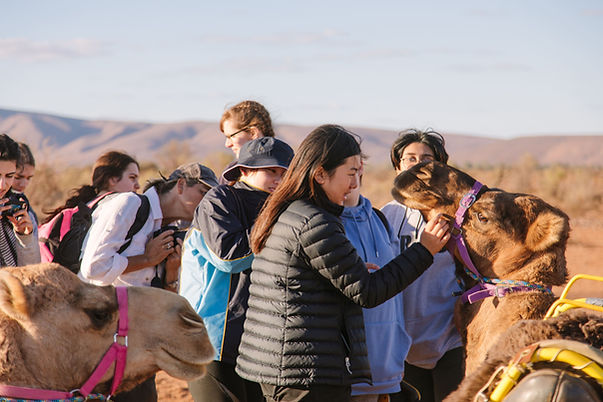
Student Growth
Exploring the arid zone with camels is an unforgettable learning experience that challenges and fosters the development of independence and resilience in students. Our camps, located in the visually expansive Outback South Australia, provide students with a unique opportunity to develop personal skills and qualities that extend beyond the capabilities of any other outdoor camp.
Our camps are particularly distinctive for their combination of outdoor activities with animal husbandry. Students eagerly engage with the camels, and those with spectrum challenges often flourish while caring for and interacting with these animals.
Our experienced staff provide opportunities for students to rotate camping overnight with the camels, exposing them to intellectual, physical, and emotional challenges under demanding arid zone environmental conditions. Through these experiences, students can unearth personal strengths, develop confidence, and learn the value of cooperation. Our aim is to instill in every student the belief that they can overcome obstacles encountered during the camp and beyond as they journey through life.
In addition to learning about resilience, gratitude, and mindfulness, our students participate in creating a community spirit of optimism and teamwork. They also recognise and analyse their own and others' strengths, further enhancing their personal and social development. Join us for a worthwhile experience that will provide your students with lifelong memories and invaluable personal growth.

Working with Teachers
One of the highlights for our team each year is welcoming and supporting visiting teachers and students on camp. We believe that there are many benefits to students spending time in an outdoor environment. Encountering skills such as creative problem-solving and risk negotiation are important milestones in adolescent development.
Our team has found the most success by working closely and cooperatively with teachers on camp, ensuring regular open communication. We welcome daily revision of objectives, taking both the student group as a whole and individual students into consideration. Our role is to support teachers and facilitate unforgettable school group journeys.
During school camps, our team maintains a professional and positive approach. The unpredictability of the great outdoors has fostered a flexible and resourceful mindset in many of us. We have specific training to ensure that all activities and objectives, including camel-related activities, are fulfilled safely and constructively. Some team members also assist with meal times and camp set up and pack up.
Our camps have a strong focus on the journey, traversing landscapes during the day with every night spent at a new campsite. We encourage teamwork between our staff and teachers to ensure that students are actively involved in their journey. In moments when all scheduled activities are completed, we appreciate teachers using this time to encourage their students to complete personal journals or any other activities they would like to undertake.
We aim to offer you and your students an unforgettable outdoor camping experience that supports their growth and development.
Camp objectives
-
Collaborate with school teachers to facilitate the overall camel and camping experience
-
Prepare, brief, deliver, supervise, and debrief all practical camel-related activities and daily transitions between campsites
-
Support the allocation of student participation groups, such as cooking, pack-up, lunches, navigation, and camel husbandry groups
-
Ensure safety standards are met during the camel and camping experiences
-
Ensure smooth logistical operation of the experience, including mapping from one campsite location to the next
-
Liaise with teachers to give and receive feedback on how the camp is running and make improvements as a team
-
Work with teachers to ensure students understand and respect behavioural standards and camp safety guidelines
-
Meet with teachers every morning and evening to participate in briefings and debriefings to keep everyone clear on the day's progress and address any issues or concerns
-
Provide supervision during movement between camps and all camel-related activities to minimise idle free time for students
-
Emphasise student supervision at all times in a remote location, including frequent head counts that double as hydration breaks
-
Support teachers in providing discipline and behaviour management according to their school's guidelines and implementing basic strategies for behaviour management and discipline to operate safely and optimally for students' camp journey.
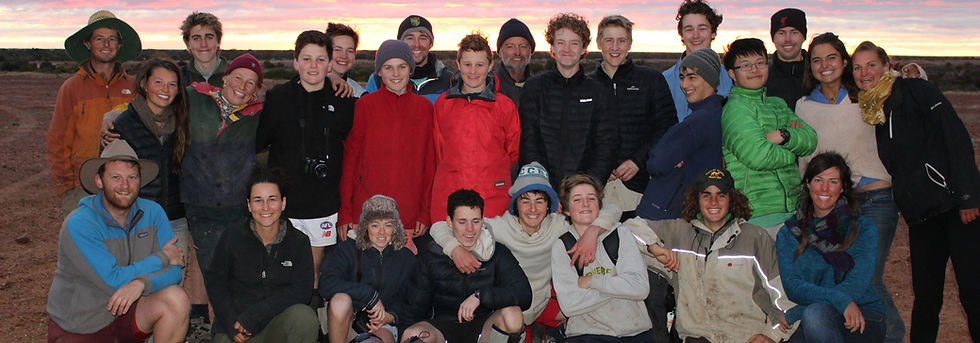
Camp Options
Non Riding Camps are quoted at a reduced rate per student.
AFGHAN STYLE CAMEL TREKS -
-
Best suited to Years 7 - 12
-
High degree of hands on animal husbandry
-
Non riding - students load equipment on camel pack saddles
-
Walking more kilometers than other camp groups
-
Most popular with secondary boys groups
-
Focus on creating high degree of independence and team responsibility
-
Typical camp duration 3 - 11 days
TREKKING with Focused Activity Groups
-
Suited to Years 7 - 12
-
Encompassing animal husbandry, navigation, camp-site set-up, and cooking
-
Riding and overnight camping with camels in rotational groups
-
Walking an average of 8 - 10 - 15 kilometers depending on student ages & weather
-
Most popular style of camp
-
Focus on building team work and independent resilience
-
Typical camp duration 3 - 7 days
PHOTOGRAPHY & ASTRONOMY THEMED CAMEL TREK
-
Suited to Years 8 - 12
-
Encompassing focused study of photography and astronomy, camping and cooking
-
Riding and often staying at a dedicated base camp
-
Walking an average of 5 - 8 kilometers depending on student ages & weather
-
Most popular with secondary girls schools
-
Focus on studying the Art of Photography and evening Astronomy lessons
-
These camps require scheduling outside of the full moon
-
Typical camp duration 3 - 5 days
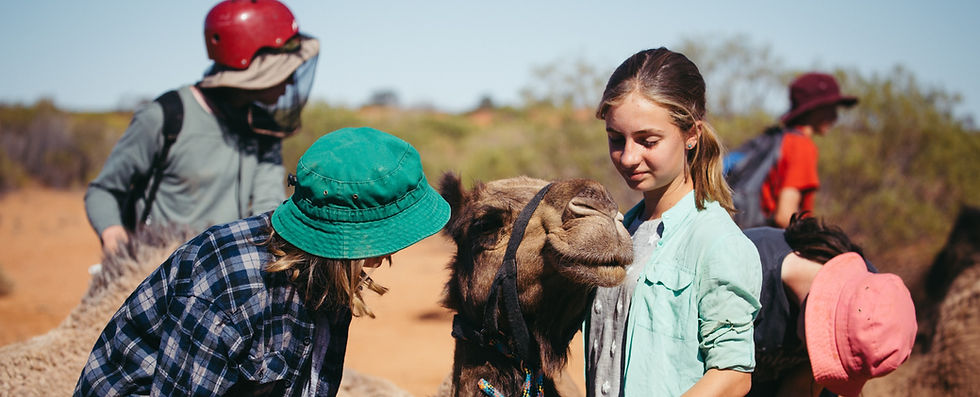
Early Morning program
We encourage teachers to pre-arrange 4 student groups with 2 rotating team leaders per group prior to arrival at camp. These groups will cycle through days in one of the following activities.
The aim of the camp is to have student groups facilitate their own journey as much as practically possible.
With supportive supervision and a commitment to organisation, students can be the leaders of many aspects of their camp, such as timekeeping, navigation, cooking, and campsite setup. Wherever appropriate, students are encouraged to take responsibility for the tasks in their daily activity brief.
On the first evening, students are briefed to remain in their swags until informed to rise by a teacher at the specified time. Other than using a toilet tent or obtaining drinking water, no unsupervised exploration is permitted.
Once advised to rise, students will commence pack up. Staff and teachers will ask students to check their swags for dampness to avoid rolling them up with wet bedding. If swags are wet/damp, students can zip up the external canvas layer and turn swags to face the sun to encourage drying. If swags are dry, they can be immediately rolled, secured with straps, and carried to the appropriate trailer prior to breakfast.
Below and in following pages is a general, brief outline of student activity groups during camp:
A. 'The Breakfast - Navigation - Damper Makers - Overnight camping with Camels Group'
-
Rise 30 minutes earlier than other groups
-
Breakfast preparations, setting up breakfast selection table
-
Creation of a large fruit salad bowl, scrambled eggs, and warming breakfast wrap breads
-
Preparing dishwashing tubs and waste bags
-
Packing away breakfast supplies
-
Washing any necessary dishes
B. 'The Cameleers - Evening Meal Group'
-
Rise early with staff Cameleers
-
This group will have slept overnight with the cameleers and will be either shepherding the camels or feeding them hay
-
They will pack their bags and swags and join breakfast when it is ready
-
The cameleers are ideally the first group to eat breakfast, prepare their lunch wrap, and fill drink water bottles to capacity
-
Cameleers will return to the camels post breakfast & lunch preparations to commence/continue grooming and saddling
-
The cameleers group is the first group to leads the camel strings with experienced cameleers assisting.
C. 'The Lunch - Evening Meal Group'
-
Following the rolling of swag and carrying to the appropriate trailer, this group will immediately commence lunch preparations of assorted wraps, dressings, and fillings/toppings.
-
If necessary, this group will top up lunch options if they run low, e.g., chopping more lettuce, cutting more tomatoes, grating carrots, cheese, etc.
D. 'Outback Explorers - Camp Creators - Evening Dessert'
-
Outback Explorers are in charge of checking the toilet tents upon rising and stocking additional supplies if required
-
Following swag pack-up, breakfast, and personal luggage pack-up, 'Outback Explorers' oversee the pack-up of the campsite, swags, and student's luggage into trailers, and dismantling of toilet tents
-
Perform a clean sweep of the area, making sure all rubbish is placed inside garbage bags.

Morning program
Following breakfast and making lunch wraps, students check their day bags are prepared.
A. 'The Breakfast - Navigation - Damper Makers - Overnight camping with Camels Group'
-
Select two student team leaders who will act as primary navigators using a GPS Handset, as well as compasses.
-
One team leader will carry a UHF handset in order to be in communication with staff.
-
Collect navigation compasses, GPS, UHF, and prepare for a briefing with staff.
-
Pack a small notepad to record any animal tracks, scats, and anything of significance, including flora and fauna.
B. 'The Cameleers - Evening Meal Group'
-
Once this group has completed camel husbandry tasks, we depart for the next campsite, traversing landscapes and navigating the best path for the camels and students leading the camel strings.
-
Camels need to walk in a manner which we refer to as contouring. We avoid walking straight up and down a sand dune. Instead, we walk up the west side of the dune facing south and descend the east side of the dune facing north. We will explain to students why, along with a lot of early explorer ways of working with camels.
-
Pack a small notepad to record any animal tracks, scats, and anything of significance, including flora and fauna.
C. 'The Lunch - Evening Meal Group'
-
Changeover of students leading the camels after lunch - to be supervised by a teacher.
-
Pack a small notepad to record any animal tracks, scats, and anything of significance, including flora and fauna.
D. 'Outback Explorers - Camp Creators Group - Evening Dessert'
-
Select two student team leaders who will act as primary navigators using a GPS Handset as well as compasses.
-
One team leader will carry a UHF handset to be in communication with staff.
-
Collect navigation compasses, GPS, UHF, and prepare for a briefing with staff.
-
Pack a small notepad to record any animal tracks, scats, and anything of significance, including flora and fauna.
Once all of the above tasks have been completed, we request teachers supervise students until we are ready for departure, which is dependent on The Cameleers group completing camel husbandry tasks. Please check that all students have packed their lunches, fruit, muesli bars, and water bottles or bladders are filled to capacity inside their day backpacks.

Lunch - Afternoon - Evening program
A. 'The Breakfast - Navigation - Damper Makers - Overnight Camping with Camels Group'
-
Student team leaders set regular hydration breaks and calculate the halfway point to schedule a lunch stop.
-
On arrival at the camp, students collect firewood and check if there is enough for baking damper bread and cakes.
-
A pile of firewood is set aside for the evening campfire circle and breakfast cooking.
-
The group selects a site for cooking and lights fires with staff and teacher observation.
-
A site for shared evening fire is selected, and chairs are set up to create a campfire circle for the entire class.
-
The group prepares and cooks cake and/or damper bread.
-
The day concludes with a campfire circle gathering and teacher-led activities.
-
This group does not set up swags with other students. Instead, they will camp overnight with the staff cameleers and camels.
-
The group will rise with the staff cameleers and become tomorrow's 'Cameleers - Evening Meal Group.'
B. 'The Cameleers - Evening Meal Group'
-
Following the lunch break, this group walks with the camels, recording any animal tracks, scats, and anything significant on the way to the next campsite.
-
During the walk, they think about presenting something about their experience of sleeping with the camels overnight, brushing, saddling, and riding until lunch at the evening campfire.
-
Interested students may lead certain camels under supervision, depending on the terrain.
-
On arrival at the camp, the group washes hands and begins creating the evening meal.
-
The day concludes with a campfire circle gathering and teacher-led activities.
-
Lights out and silence are at the discretion of teachers, as is the chosen time for advising students to rise.
C. 'The Lunch - Evening Meal Group'
-
Following the lunch break, this group leads the camel strings.
-
On arrival at the camp, the group washes hands and begins creating the evening meal.
-
The day concludes with a campfire circle gathering and teacher-led activities.
-
Lights out and silence are at the discretion of teachers, as is the chosen time for advising students to rise.
D. 'Outback Explorers - Camp Creators - Evening Dessert'
-
Student team leaders set regular hydration breaks and calculate the halfway point to schedule a lunch stop.
-
Upon arrival at the camp, this group selects the best location for swags in relation to the allocation of a cooking area, campfires, group circle fire, toilet tents, camels, and a vehicle exit and entry point.
-
The group selects a toilet tent area, digs deep holes per tent, erects toilet tents, and places toilet provisions inside.
-
Once main meals and salads are prepared, this group prepares the evening dessert.
-
The day concludes with a campfire circle gathering and teacher-led activities.
-
Lights out and silence are at the discretion of teachers, as is the chosen time for advising students to rise.
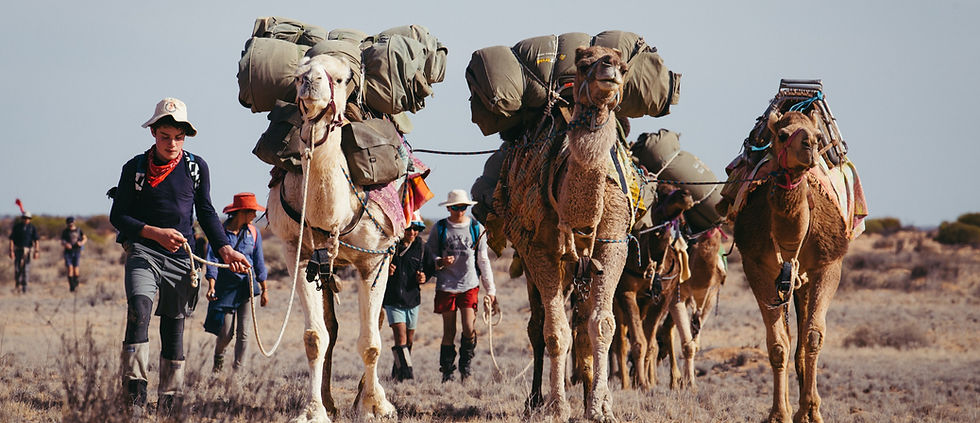
Return Charters from Adelaide City or School
Recommended Transport Provider: Kanga Coachlines
When arranging group transport for your trek, we recommend Kanga Coachlines — a trusted, professional operator offering more than just a ride.
Why Choose Kanga?
-
Modern, Clean Fleet
One of the newest fleets in Australia, impeccably maintained to the highest standards. -
Professionally Trained Drivers
All drivers are thoroughly inducted and trained for safe, reliable service. -
Live Vehicle Tracking
All coaches are equipped with satellite tracking for real-time monitoring. -
Responsive Customer Service
-
Fast turnaround on quotes and bookings, with a dedicated team ready to assist.
-
Flexible Charter Options
-
School transfers and runs
-
Extended touring
-
Large group movements
-
Emergency or last-minute arrangements (e.g. airline or rail disruption)
-
Booking & Enquiries
-
Website: www.kanga.com.au
-
Email: team@kanga.com.au
-
Phone: (08) 8262 5111
If you haven’t received a response within 24 hours, please follow up with a phone call.
Teacher Testimonials

YEAR 7 CAMEL TREK The Year 7s have returned home from their Camel Trek in the Flinders Ranges. They drove home on Saturday with a bus load of silent, sleepy students. Year 7 Educator, Jase Shepherd, had time to reflect on the amazing experience that they have all shared. Adam Stevens and Jase, talked about giving the students a unique experience that would be life changing, and they have no doubt been successful! Before bed on the last night, they ran a circle time where they gave each student opportunity to share their oranges (the sweet moments) and lemons (the sour/ challenging moments). The students’ responses blew them away with their humility, connections with each other and their ability to overcome their “uncomfortable”. Every single student had an inspiring story to share of their own growth or growth that they recognised in one of their peers. All of our students faced challenges during their time away. They have battled home sickness, heat stress, uncomfortable weather conditions, tiredness, a mysterious tummy bug, and their own personal struggles all while in the desert - one of the most raw and exposing environments that we have. Even Jesus was tested in the desert and took time to seek and be still in the middle of that space. All of our students have had a successful camp. That success looks different for each of them, just like in the classroom. The resounding response from the students was the relationships and connections made through those challenging moments, were their “oranges”. The camels were amazing. The scenery was vast and breathtaking. The night sky was so delicately detailed. Soursob Bob’s songs were hilarious. The process of setting camp and swags became familiar and enjoyable. The pool was rejuvenating. Finishing ancient indigenous artifacts in the sand dunes was fascinating. The history of Beltana and Cameleering was inspiring and gave the students a new perspective on their home comforts. However, all these experiences were just vehicles for connections, and this is of the greatest value. Our meekest students became the bravest. Our loudest became the most sensitive to those around them. We have students that served selflessly. Students that lead with courage and others that lead with humility. Students that calmed and comforted. This group is amazing and received great praise from us as their Educators, and the Cameleer staff as well, who recognised their kind nature and selfless attitudes. We as Educators, are so, so, so proud of our students. Jase, Adam, Lynda, Jasmin and Sabina | Educators
Jason- Christian School
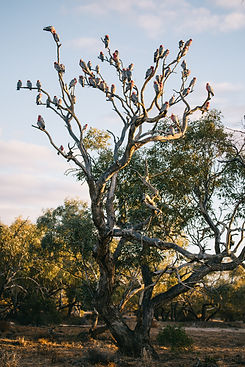
I want to personally thank the entire team for your very dedicated, inspiring camel trek with my class. You provided everything that was needed for the class to take the next step in their development from childhood to adolescence in a way that has left an enduring and significant and very positive mark in their memory that they will draw on for their lifetime. Every childs' verbal reflection has shown me that they took in far more than they appeared to while on camp and they are truly thankful to you all for your individual and collective effort and engagement. Many have talked of significant internal shifts within themselves that they can acknowledge already, giving them the courage to do things they could not have beforehand. One girl spoke for the first time to anyone, of her father who passed away one and half years ago. Quite a few overcame very strong homesickness. Many of the class also really enjoyed the individual connections they made with different staff throughout camp and the diversity of cultures and age seemed to be a strong highlight for them. I always believed the 7 day trek was key to this level of internal development. On a personal level it was a wonderful adventure on many levels. Having grown up partly in Scotland, then NZ, I am still learning to know the Australian environment and people. It was my first time into the Flinders Ranges and I have a deeper appreciation for the beauty and depth of history in the outback than I have ever had before. To live simply in, on and with the land and natural environment was so timely in this mysterious 2020 historical moment. To be reminded that city life is so complex in the built up environment with the huge number of people, the busyness and hurried approach we are all living with and being drawn into without time for reflection. Being able to adjust to the natural circadian rhythms and engage deeply with the land as we walked each day at slow pace to new camp sites. Cooking over a fire. Learning to know camels more deeply. Staring at the night sky in wonder and contemplation. Sharing conversation with new people. Listening to the land and the wind and the camels, then listening within during quiet times. Being reminded of the simplicity of life is the greatest gift we need in today's world. Thank you, thank you, thank you.
Thank you for a wonder filled and exceptionally professional camel trek. Your team of cameleers offered our students tremendous knowledge, guidance and opportunities. As a teacher with a class of 13 year olds, I was always kept well informed, involved and deliciously feed. Thank-you for graciously and expertly facilitating extension experiences for keen students to get more hands-on with the camels. I highly recommend Camel Treks Australia as an ideal middle school camp. The week was transformative for both students and staff alike.
Tis - Outdoor Ed.Teacher
Helen -Steiner Class Teacher


.png)
